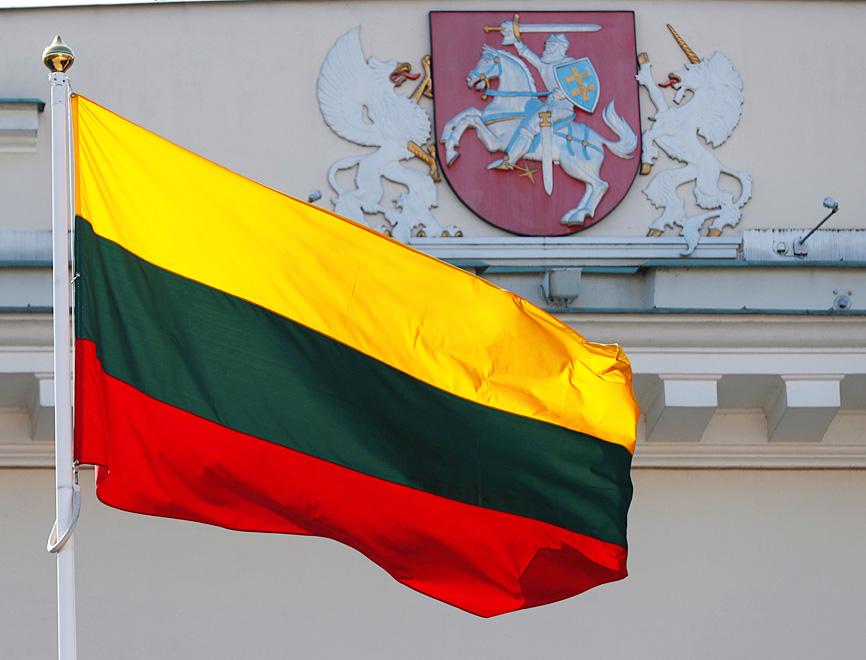Sixty-two European lawmakers from 20 countries on Friday sent a joint open letter to Lithuanian officials, backing the Baltic nation’s plan to deepen its ties with Taiwan.
“We write to express our solidarity and our support for Lithuania against the threats, intimidation and bullying behavior targeted at the Lithuanian people by the government of the People’s Republic of China,” they wrote.
“The Chinese government’s aggressive actions towards Lithuania are symptomatic of its broader refusal to abide by norms, values and standards of the international rules-based order,” the lawmakers added.

Photo: Reuters
The letter was initiated by EU lawmakers Petras Austrevicius of Lithuania and Reinhard Butikofer of Germany, who chairs the European Parliament’s delegation for relations with China, and was endorsed by lawmakers from 20 countries and five political groups, Butikofer said in a statement.
It was addressed to Lithuanian President Gitanas Nauseda, Lithuanian Prime Minister Ingrida Simonyte and Viktorija Cmilyte-Nielsen, the speaker of the Seimas, the Lithuanian parliament. Copies were also sent to European Commission President Ursula von der Leyen and other senior EU officials.
The letter said that Beijing has put the Baltic country under pressure by recalling its ambassador and reportedly halting the issuance of export permits to some Lithuanian businesses, after the country announced that it would host a representative office bearing the name “Taiwan” in Vilnius.
Lithuania has also announced its decision to open a representative office in Taiwan in the fall.
The letter also mentioned Beijing’s de facto trade sanctions on Australia, Japan and Sweden, and its pressure campaign against the Czech Republic earlier this year, saying that China aims to coerce other countries into “geopolitical acquiescence.”
The letter called on the EU to “take a firm stance against the Chinese government’s coercive diplomacy” and reiterated the right of its member states to “conduct their economic, cultural and diplomatic relations with Taiwan as they see fit.”
In Taipei, the Ministry of Foreign Affairs yesterday welcomed the open letter, thanking the bloc’s legislature for showing support to Taiwan after its foreign affairs committee on Wednesday passed the EU-Taiwan Political Relations and Cooperation report and related proposals.
China’s bullying of one EU member state has prompted European lawmakers to go beyond their political differences to express solidarity, the ministry said.
During a discussion on the EU’s relations with China at an informal meeting of EU foreign ministers on Friday, Lithuanian Minister of Foreign Affairs Gabrielius Landsbergis said that the EU must adhere to its values and reduce dependence on trade with China.
The EU must also coordinate its China policy with like-minded countries in the Indo-Pacific region and beyond, as well as reinforce EU-NATO cooperation on China issues, Landsbergis said in a statement on the ministry’s Web site.

DAREDEVIL: Honnold said it had always been a dream of his to climb Taipei 101, while a Netflix producer said the skyscraper was ‘a real icon of this country’ US climber Alex Honnold yesterday took on Taiwan’s tallest building, becoming the first person to scale Taipei 101 without a rope, harness or safety net. Hundreds of spectators gathered at the base of the 101-story skyscraper to watch Honnold, 40, embark on his daredevil feat, which was also broadcast live on Netflix. Dressed in a red T-shirt and yellow custom-made climbing shoes, Honnold swiftly moved up the southeast face of the glass and steel building. At one point, he stepped onto a platform midway up to wave down at fans and onlookers who were taking photos. People watching from inside

A Vietnamese migrant worker yesterday won NT$12 million (US$379,627) on a Lunar New Year scratch card in Kaohsiung as part of Taiwan Lottery Co’s (台灣彩券) “NT$12 Million Grand Fortune” (1200萬大吉利) game. The man was the first top-prize winner of the new game launched on Jan. 6 to mark the Lunar New Year. Three Vietnamese migrant workers visited a Taiwan Lottery shop on Xinyue Street in Kaohsiung’s Gangshan District (崗山), a store representative said. The player bought multiple tickets and, after winning nothing, held the final lottery ticket in one hand and rubbed the store’s statue of the Maitreya Buddha’s belly with the other,

‘NATO-PLUS’: ‘Our strategic partners in the Indo-Pacific are facing increasing aggression by the Chinese Communist Party,’ US Representative Rob Wittman said The US House of Representatives on Monday released its version of the Consolidated Appropriations Act, which includes US$1.15 billion to support security cooperation with Taiwan. The omnibus act, covering US$1.2 trillion of spending, allocates US$1 billion for the Taiwan Security Cooperation Initiative, as well as US$150 million for the replacement of defense articles and reimbursement of defense services provided to Taiwan. The fund allocations were based on the US National Defense Authorization Act for fiscal 2026 that was passed by the US Congress last month and authorized up to US$1 billion to the US Defense Security Cooperation Agency in support of the

HIGH-TECH DEAL: Chipmakers that expand in the US would be able to import up to 2.5 times their new capacity with no extra tariffs during an approved construction period Taiwan aims to build a “democratic” high-tech supply chain with the US and form a strategic artificial intelligence (AI) partnership under the new tariffs deal it sealed with Washington last week, Taipei’s top negotiator in the talks said yesterday. US President Donald Trump has pushed Taiwan, a major producer of semiconductors which runs a large trade surplus with the US, to invest more in the US, specifically in chips that power AI. Under the terms of the long-negotiated deal, chipmakers such as Taiwan Semiconductor Manufacturing Co (TSMC, 台積電) that expand US production would incur a lower tariff on semiconductors or related manufacturing